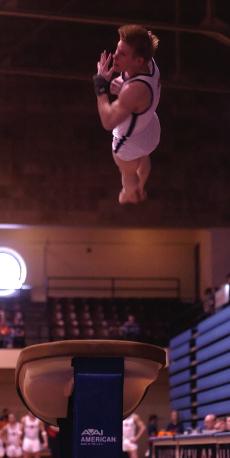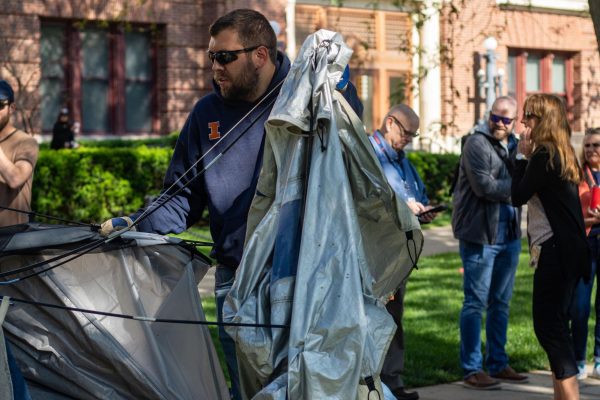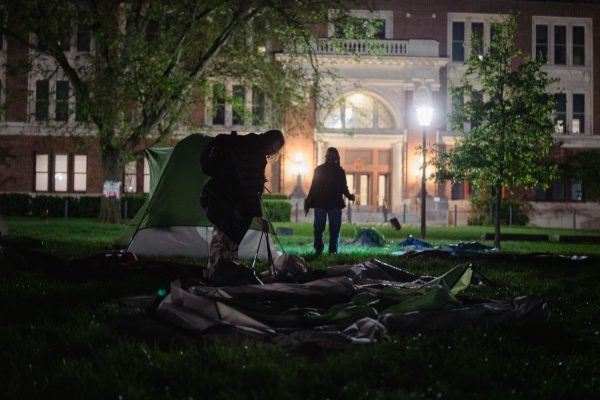Springing forward

May 3, 2006
Growing up in Virginia, senior Justin Spring lacked the form and direction needed to stand out in the sport of gymnastics, offering only a glimpse of the premier gymnast that today has his sights set on the 2008 Olympics in Beijing, China.
He describes himself as the hyperactive kid that coaches hated, the wild child running around the gym engaging in an excessive amount of flips. He was the one with no basics, no form and terrible flexibility, a skill vital at such an early age. For the son of collegiate gymnasts, it seemed his stint in the perfection-driven sport would be short-lived.
But after his first Junior National team camp in 1998 and a subsequent talk with his coach, Spring was told to settle down, find out what he wanted to accomplish in gymnastics and then apply it.
“And from then on, I really wanted to do something big in the sport, and I guess I just had to learn,” Spring said.
His coach’s words were not taken lightly as the following year he earned a first-place finish on parallel bars at the 1999 John Hancock U.S. Championships.
Get The Daily Illini in your inbox!
It was then, Spring said, that he realized he possessed the potential to excel. An all-around title at the 2000 John Hancock event and a second-place finish in the all-around at the 2002 Junior Olympic nationals in San Diego, Calif., made Illinois assistant coach Jon Valdez take notice.
Spring came to Illinois as the No.1-ranked recruit in the country in 2002. Despite his extensive resume in national competitions, it was at Illinois that he came into his own, both in the gym and outside of it. Spring admits he came to Champaign as what he thought was a mature, grown up individual. He was instead a young, naive freshman, “eyes wide open to the college scene.” And also the one who often couldn’t hit the big routines when they counted.
Fast forward four years, and the five-foot-seven senior who will be graduating in just weeks with a degree in speech communication, has learned to put his priorities in order and has reveled in the greatest thing the sport has taught him: discipline. His maturity as an individual is what has allowed him to mature as a gymnast, Valdez says.
“Obviously, his skill level has just shot through the roof, but I think the thing that makes him stand out is the fact that he has actually taken the time to really polish things up and add presentation,” Valdez said. “He has a presence now that he didn’t even have two years ago.”
Breaking beyond
With four Big Ten titles and one NCAA title during the 1980s, Illinois gymnastics was brought to the national forefront. But with only one top-three national finish during the ’90s, the program was in desperate need of new talent. Spring and senior Adam Pummer, who was the nation’s No. 2 recruit in 2002, provided the answer in their increased energy and excitement, said Valdez, who coached 2000 U.S. Olympian and six-year Senior National team member, Sean Townsend.
“The main thing they (Adam and Justin) brought, aside from their skill level, was just confidence in being able to do their routines,” he said. “And I just think that rubbed off on everybody else on the team over the last four years.”
Asked to compete in numerous events his freshman year, it wasn’t until Spring’s sophomore year that he was able to make an impact. He spent much of his freshman season in a cast with a broken wrist. During that first season, Spring said, it was comforting to know that he had other teammates competing after him in meets. He wasn’t the one everyone was counting on to hit routines.
During his sophomore and junior seasons, he consistently started to place on high bar. But even before nationals in April, he turned heads at the prestigious U.S.A.G. Winter Cup in February when he finished tied for third on high bar with 2004 Olympic gold medalist Paul Hamm. With his finish at the Winter Cup, he was named a member of the U.S. Senior National team and later won the 2005 Visa Championships high bar title, becoming the first Illini to ever win a U.S. national title.
He was a force on the collegiate gymnastics scene as well, finishing first on high bar at the NCAA Championships with a 9.775 to earn All-American status on the event for the second straight year.
Last November he was named a member of the 2005 World Artistic Gymnastics Championships in Melbourne, Australia.
The humble, people-pleasing Burke, Va.,-native now believes USA Gymnastics has faith in his ability to compete at the highest level.
“I haven’t always been that guy,” Spring said. “I’ve been rather inconsistent back when I was younger, on the Junior National team. I always made it, but they always worried about my consistency. I think I finally broke through my childhood impression.”
Standing out among seniors
Through his consistency, he has etched his name as one of Illinois’ greatest gymnasts. He ended the season and his four-year career with 47 overall titles. Although his senior campaign ended nearly a month ago at the NCAA Championships in Norman, Okla., without a national team title – the Illini came in second by just .550 of a point – he said he knows that these last four years will be remembered as redefining. Even if, as he says, no one ever remembers second place.
He also added five All-American honors this season to bring his total to 12 – the most in nearly 50 years – and won two more national titles in parallel bars and high bar to bring his total number of individual national titles to four.
But of all the honors, the one that stands out is the award he received just a day before the NCAA Championships – the Nissen-Emery Award. The honor is bestowed upon the nation’s top senior gymnast and is voted on by coaches, athletes, judges and peers, which is why it means a great deal to him. Not since 1989 had an Illinois gymnast received the distinction.
However, sophomore Michael Boyer said he knew even before Spring’s name was called that he would get it. He was the best senior gymnast by a long shot, Boyer said.
The award, which Spring keeps in the center on the top of his desk over his computer, is one of the awards, he says, he is “really proud of.”
“To be looked at in such high regards and respect from fellow teammates and coaches and judges was such an honor,” Spring said. “To be nominated, let alone receive that award; that was amazing.”
Leaving a legacy
But with Beijing – and the Olympics – becoming more of a reality each day, and his individual aspirations replacing his former team goals, Spring said the hardest part of helping bring lllinois gymnastics back into the national spotlight is leaving. Although he is looking to become an assistant coach at Illinois next season, Spring says it will not be the same.
Despite his countless individual accolades, Spring has always defined himself by the team. His most memorable moment at Illinois came during the 2004 Big Ten Championships when the Illini won the Big Ten title for the first time since 1989. Illinois was competing with the same squad that, just a year before, finished sixth in the conference.
He will miss the feeling he had at NCAAs this year when he, Pummer and sophomore Wesley Haagensen swept the top three spots on parallel bars. And will also miss the three-hour road trips with his teammates that fail to bore.
“It’s different when you’re on the team and you’re fighting for the same goals and going through the same sacrifices,” Spring said.
The outgoing gymnast does not want to be remembered because of the seemingly endless hours that he spent in the gym and his myriad of accomplishments. Instead, he hopes to be remembered as a good friend. Valdez describes him as an individual that doesn’t get caught up in trying to be somebody he’s not.
“He cares about other people, he cares about his teammates,” Valdez said. “He appreciates what he has, appreciates what has gotten him here and he doesn’t take things for granted.”
Spring says that he attributes any of his skill or what he has accomplished to his teammates pushing him in the gym. It’s a training atmosphere that has allowed him to flourish. With his NCAA career and the pressures of competing in an 11-week collegiate season now over, he is able to focus on what it will take to get to the next level. His ability to learn new skills, his extreme lack of fear and his exceptionally good “air sense,” he says, will help him reach his Olympic goals.
“The thing that people don’t know about him is that he can do anything he wants, perform any skill that he wants,” said Pummer, Spring’s roommate for the past four years. “It’s so easy for him; it may look crazy sometimes, but it’s just because he’s having fun with it. That’s the unique part about this sport, and that’s why he’s so good at it.”
With tricky and somewhat dangerous skills mastered and his consistency harnessed, the only obstacles in his way are physical immaturity and his untested ability training at such a high level.
Gearing up for the Games
But with unwavering determination, Spring knows he has put too much effort into his 19 years in the brutal sport of gymnastics to think about something so miniscule as physical limitations and inexperience getting in his way.
When he needs an extra bit of motivation, he says he only needs to look as far as his friend and 2004 all-around gold medalist Paul Hamm. Hamm’s dedication, Spring says, was taken to another level, and continues to blow his mind.
“I hope that I get that work ethic and really buckle down and do what he did,” Spring said of Hamm. “He just got past the boredom of routine after routine and just became this machine that was so conflicted. And at a point that is what you have to do for the Olympics; your Olympic routine has to be like taking a walk to the corner store.”
Spring’s continued quest to impress those on the Olympic committee resumes May 13, when he competes in the World Cup in Ghent, Belgium. Since the sport bases its Olympic team selections politically and off the big names, Spring said establishing himself in the next two years will be vital. After staying in Champaign for one more year, getting to use Illinois’ facilities and possibly coaching the nationally-ranked team, Spring plans on moving to the Olympic Training Center in Colorado Springs, Colo.
Although Spring may have reservations about his chances of becoming an Olympian, Pummer believes Spring’s style will take care of any doubts the committee could entertain.
“The U.S. wants to put Justin on a team because he’s not going to only make an impression, but he’s going to make a performance for the country, just like Paul and Morgan (Hamm) did,” Pummer said. “They changed not only the image of themselves, but of how our country does gymnastics.”
Despite only a one-week break after nationals, Spring has been back in the gym and upgrading routines that have set him apart in the past – including a triple-twisting double-back somersault on floor exercise and a laid out Kohlman, referred to as a Cassina, on parallel bars. He will challenge going past his usual four events – parallel bars, high bar, floor exercise and vault, by training for the all-around leading up to the 2006 Visa Championships in August. Spring’s intention is to challenge NCAA all-around champion Jonathan Horton, who competes for NCAA title-winning Oklahoma, for the title in three months. With consistent training, he says, he should easily be able to make up the 0.400 points he fell to Horton by at nationals.
The task of becoming an Olympian may be daunting to some, but if Spring continues on his current path, nothing should stand in his way, Valdez said.
Spring’s need to focus on the “bad” has allowed him to define – and fix – his mistakes, a philosophy he will continue to use. And although his training is difficult, he takes solace in the fact that he can now customize his workouts to his individual needs. For Justin Spring, the young gymnast growing up in Virginia who was discouraged from doing excessive amounts of tumbling, it is now those same flips and re-catches of the bar that could make him Illinois’ fifth Olympian, and first since 1992. Asked as a 10-year-old boy if he was going to the Olympics, he could only muster a meek, ‘Maybe.’ His answer now as a confident 22-year-old standout is a defiant and resounding, ‘Absolutely.’
“Since I was young, I’ve always wanted to be the kid that stood out,” Spring said, “And I think that shows in my gymnastics.”






